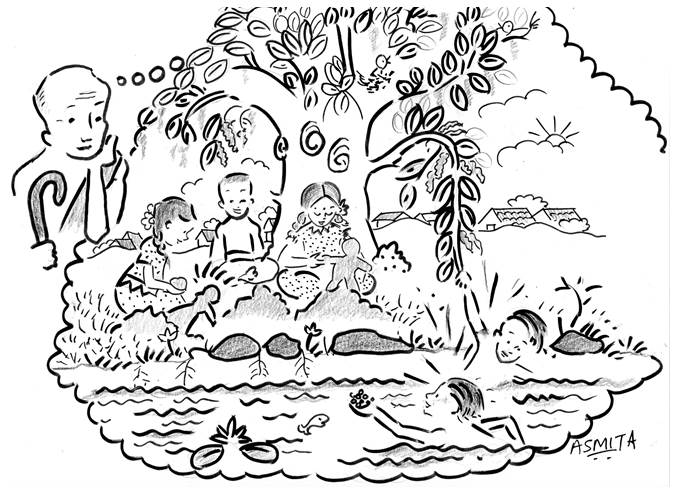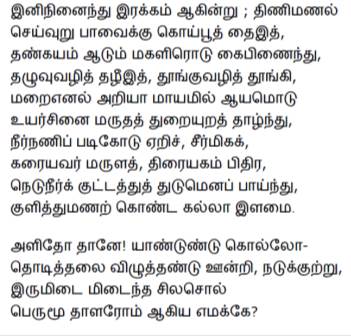Puranaanooru is an anthology of the Tamil Sangam literature, written by both men and women poets belonging to 1800 to 2500 years before the Common Era. The 398 verses are in classical Tamil with very few Sanskrit words interwoven, which clearly indicates that Tamil’s history is parallel to Sanskrit’s. In the verse presented here, the only Sanskrit word is maayam.
The oldest Tamil book available today — dated a few centuries before the Common Era — is Tholkappiyam, a book on grammar. If you have a book on grammar that old, it is obvious, the language itself was sophisticated even at that time with a very rich and long history.
The Puranaanooru verses deal exclusively with secular themes. They describe the valor, pride, pettiness, generosity, and even philandering of kings; they admonish kings to be loyal to their wives; they advise kings not to let bureaucrats harass citizens; they describe the grinding poverty of ordinary citizens during wars, thus trying to dissuade kings from going to war… … And they also composed odes praising the generosity of kings seeking gifts, in return.
But the verse presented here is very different. In this, the poet, Todittalai Vizhuttandinaar, in his very old age, recalls with vivid imagery the innocent days of his youth long gone.
The sentiment he expresses in this poem is so universal that it transcends time, place, culture and every other facet that separates humanity into distinct demographic, linguistic, religious, and cultural groups.
Here is a free-style rendering of the verse in English:
It feels sad to think about it now.
On the sandy edges of the pond with cool water,
we played with girls who made dolls with the clayey soil,
decorating them with flowers plucked from trees nearby.
Holding hands in the innocence of youth,
we hugged each other, swaying this way and that.
Climbing the Marutha (Arjuna) tree on the bank
with its branches sagging towards the pond,
we dived into the deep pond with a thud and a splash.
Reaching the bottom, we returned showing to the
amazed onlookers on the shore the fistful of sand
we grabbed from the pond’s floor.
Where did that innocent youth go?
Isn’t it pitiful that having become old now, tremblingly
I walk holding a metal-capped stick while coughing,
barely uttering a few words in between?
For these who are interested in classical Tamil, I give below the Tamil verse. Even if you know Tamil, the masala Tamil you read in today’s weeklies and dailies or watch on TV shows, will NOT help you to appreciate the Tamil in this verse on first reading. But if you persist in reading it, you will get a glimpse of the language’s pristine beauty.
Tamil, Sanskrit, Greek, Latin, Hebrew, and Chinese are the world’s classical languages. India is the only country having given birth to World’s two classical languages — Sanskrit and Tamil. ♦


